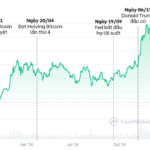 |
In recent years, the world has witnessed an explosion of cryptocurrencies and countless other forms of digital assets. Initially, this may have been a trend among adventurous investors. But now, this wave has permeated numerous sectors of the global economy. It is intricately linked to macroeconomic stability, monetary sovereignty, tax policies, financial security, and even national security.
Recently, General Secretary To Lam expressed concern about Vietnam’s delay in establishing a legal framework for new financial models, including the management of digital currencies and other types of digital assets. While we are still in the phase of consideration, research, and shaping our approach to managing digital assets, the other five countries in the ASEAN-6 region (Singapore, Thailand, Indonesia, Malaysia, and the Philippines) have already made significant strides.
Singapore has successfully established itself as one of the leaders in technological innovation, including financial technology (FinTech) and blockchain technology. The enactment of the Payment Services Act in 2019 (which came into force in early 2020) transformed Singapore into one of the hubs of Asia’s digital asset industry. Singapore provided a clear definition of “digital payment token” and mandated that cryptocurrency exchanges must obtain licenses similar to financial institutions. Additionally, Singapore has policies that strongly support tokenization projects or blockchain technologies that are beneficial in practice. The successful projects demonstrate their foresight beyond quick wealth accumulation through “virtual” money. They view digital asset technology as a driving force for the future of finance and the digital economy.
However, Singapore’s approach is not one of lax regulation or laissez-faire. They have stringent rules in place for anti-money laundering (AML), technology risk prevention, and investor protection. The country firmly says no to indiscriminate cryptocurrency advertising, bans bitcoin ATMs in public places, and prohibits marketing campaigns that entice investors. In other words, Singapore builds a solid legal foundation, managing risks while creating a space for innovation and attracting quality capital.
|
In contrast, Vietnam is lagging behind the aforementioned countries in the region by 6-8 years. At this very moment, we are still struggling with proposing a pilot legal framework and debating whether to consider cryptocurrencies as assets, commodities, securities, or means of payment. This delay has led to several consequences. |
If Singapore is considered the top destination for institutional investors and innovative startups related to blockchain technology, Thailand is not far behind in attractiveness. Notably, Thailand enacted the Digital Asset Management Law in 2018, even earlier than Singapore. The Emergency Decree on Digital Asset Business B.E. 2561 requires all exchanges, brokers, and cryptocurrency agents to obtain licenses and comply with the regulations of the Securities and Exchange Commission (SEC) and the Ministry of Finance. They also amended tax laws to impose taxes on cryptocurrency transactions in 2018.
Thailand cautiously embraced the ICO (initial coin offering) wave through official ICO portals for project evaluation. As the market heated up and speculative risks emerged, they tightened regulations by prohibiting the use of digital currencies as a means of payment. This did not mean shutting down the market, though. Thai investors are still allowed to trade various cryptocurrencies under the supervision of the SEC. The reason for Thailand’s success lies in their early adoption, timely adjustments, and the creation of a transparent environment for FinTech businesses to thrive. The Thai government was willing to take calculated risks to move forward swiftly, and they also reacted swiftly when new threats emerged. As a result, Thailand has become one of the most vibrant cryptocurrency markets globally, attracting millions of domestic users and numerous blockchain startups.
When it comes to Indonesia, it may surprise some that this country recognized cryptocurrencies as a type of commodity through regulations issued by the Commodity Futures Trading Regulatory Agency (BAPPEBTI) in 2019. Their initial goal was simply to acknowledge the phenomenon of digital currencies and bring them under the same management as derivative commodities. However, when the number of digital currency investors surpassed the total number of stock investors, the Indonesian government quickly realized the potential risks. They established a National Digital Asset Exchange and mandated that all exchanges must join to unify management and oversight.
More recently, Indonesia transferred the supervision of digital assets from BAPPEBTI to the Financial Services Authority (OJK – the agency that oversees banks and securities) to integrate digital currency management into the overall financial supervision system. This move indicates that Indonesia does not view cryptocurrencies as a standalone “game.” Instead, they aim to tightly manage them similarly to securities or financial instruments. Indonesia’s approach is flexible and pragmatic; they recognize the value of the technology while prioritizing the protection of the rupiah and monetary security.
Malaysia and the Philippines are also relatively dynamic in the digital currency space. The Philippines manages cryptocurrency activities through the Securities and Exchange Commission (SEC) and the Central Bank, while also encouraging blockchain projects that support remittances and international payments. Malaysia considers ICO activities and token transactions to fall under the purview of the Securities Commission (SC), requiring cryptocurrency exchanges to apply for licenses. Both countries started enacting regulations from 2017 to 2019, demonstrating their proactive approach to seizing opportunities and addressing challenges. Their policies tend to balance tight management with support for genuinely beneficial technological applications.
In summary, these five countries share several similarities, along with distinct differences that create competitive advantages. They all established legal frameworks early on and integrated cryptocurrencies as a legitimate part of their financial sectors. Subsequently, risk management regulations were designed and implemented. They created compliance standards related to: (i) capital; (ii) transparency of information; (iii) transaction limits for individual investors; (iv) cybersecurity; and (v) anti-money laundering. While governments did not recognize cryptocurrencies as legal tender, they did not prohibit investment or technological development. They also provided controlled regulatory sandboxes for FinTech experimentation, established national exchanges to oversee transactions, and regularly updated lists of prohibited/permitted tokens. These policies created a safe space for innovation, attracting talent and capital without compromising systemic stability.
In contrast, Vietnam is lagging behind the aforementioned countries in the region by 6-8 years. At this very moment, we are still struggling with proposing a pilot legal framework and debating whether to consider cryptocurrencies as assets, commodities, securities, or means of payment. This delay has led to several consequences.
Firstly, Vietnamese businesses lack a transparent and legal environment to develop blockchain projects, forcing them to register their companies abroad or operate in a state of legal ambiguity. This not only results in tax losses but also wastes valuable human resources.
Secondly, individual investors are not adequately protected. In cases of fraud or disputes, they have limited recourse and often find themselves entangled in lengthy legal battles.
Thirdly, the risks of money laundering and foreign currency outflows are increasing due to clandestine cryptocurrency transactions that fall outside the purview of official regulatory oversight.
Lastly, we have already fallen behind in technology and lost our competitive edge in attracting investment capital. Meanwhile, Singapore, Thailand, and Indonesia have positioned themselves as desirable destinations for technology startups.
General Secretary To Lam’s recent concerns serve as a wake-up call and reflect the foresight and determination of a high-ranking leader. Indeed, delays in establishing a legal framework in the digital age can create a daunting gap. It not only hinders the country’s development but also weakens our competitiveness and financial security. If we continue to hesitate, we risk missing out on the blockchain and digital asset boom. The five countries in the ASEAN-6 region have each charted their own path, but they share a common lesson: we must dare to face the risks and seize the opportunities to build a suitable management framework. Vietnam can learn from these experiences, selectively adopting and flexibly adapting them to our domestic context. Our only choice is to be decisive, proactive in experimentation, and continuously adjust our approach. If we miss this opportunity, the cost could be far greater than our fears of enacting policies and regulations.
Luu Minh Sang (University of Economics and Law, Vietnam National University, Ho Chi Minh City)
– 16:00 07/03/2025
Revolutionizing the Online Real Estate Market in Hanoi and Ho Chi Minh City
The digitalization of real estate transactions is inevitable, but online real estate platforms can still be susceptible to price manipulation and speculation. To ensure transparency and prevent such issues, it is crucial to integrate these platforms with notarization, taxation, and banking systems.
The Race to the Top: Unlocking HCMC’s Financial Hub Potential Amid Challenges
As Vietnam’s economic powerhouse, Ho Chi Minh City is ambitiously striving to establish itself as an international financial hub. This strategic vision is aimed at bolstering its economic stature and attracting global investment. It is not merely a city ambition but a pivotal component of the nation’s growth strategy, setting a new course for Vietnam’s economic future.





















